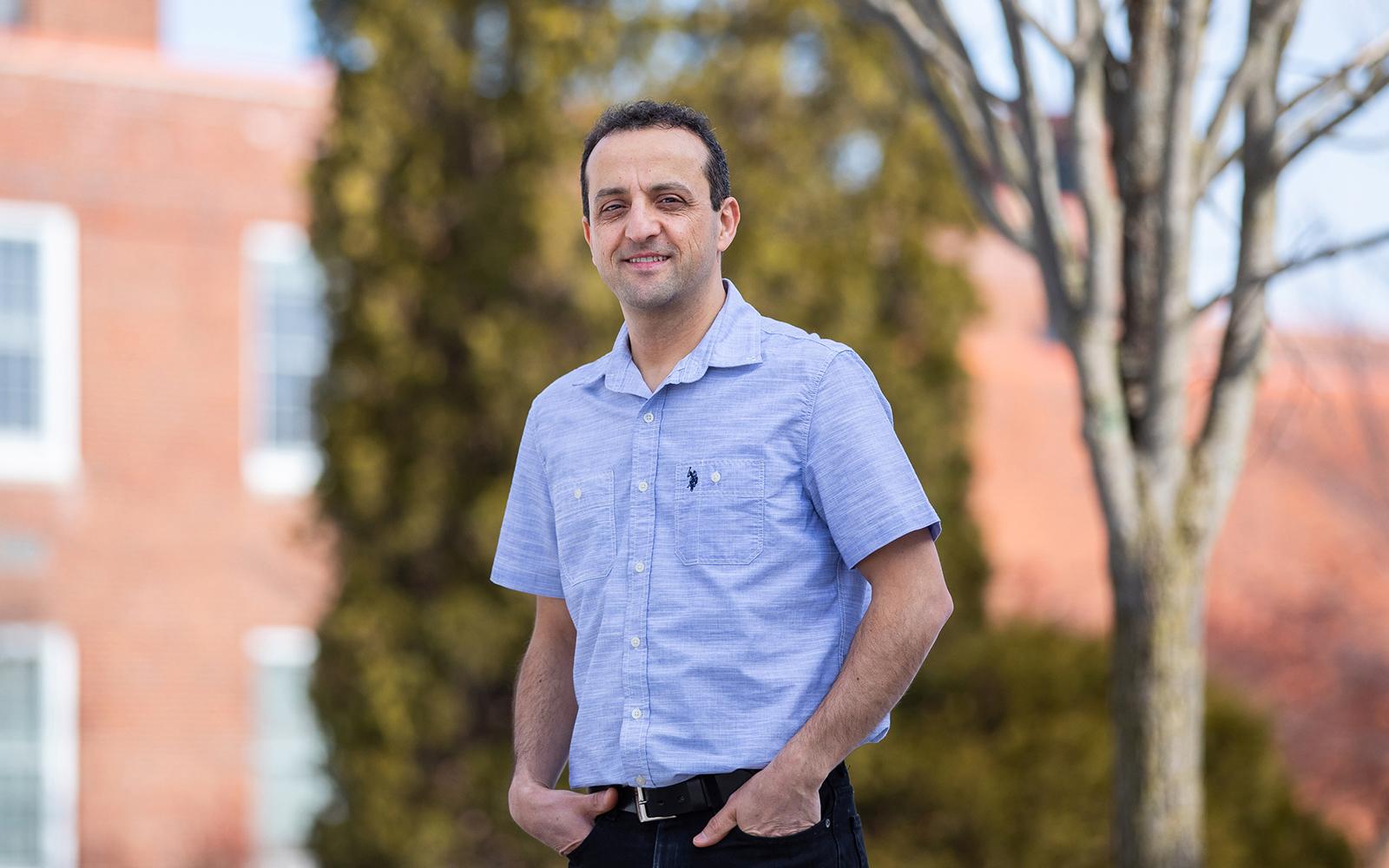SUNY Potsdam Chemistry Professor Dr. Fadi Bou-Abdallah Awarded $1.1M NSF Grant to Study Iron Regulation in the Body
SUNY Potsdam Professor of Chemistry Dr. Fadi Bou-Abdallah has been awarded a research grant from the National Science Foundation to study how iron, an essential micronutrient required for most living organisms, is trafficked between cells.
The $1.1 million NSF grant will investigate the biochemical, biophysical, structural and cellular properties of key molecules involved in iron regulation and trafficking in humans. The project will also unravel mechanistic details of previously uncharacterized protein-protein and protein-iron interactions, both at the molecular and cellular levels. This new round of funding follows two previous research grants from the National Institutes of Health and NSF, totaling $865,000 together, to support Bou-Abdallah’s research on a novel process to synthesize a variety of iron-storage proteins called isoferritins that he and his students have pioneered. To date, Bou-Abdallah has secured more than $2.5 million in grant activities to study iron metabolism in humans.
“Dr. Bou-Abdallah is a prolific researcher with an impressive track record of securing external funding. His research has practical applications across STEM, from chemistry and biophysics to the health sciences. The work he does with his students is one of the best examples of SUNY Potsdam’s commitment to applied learning,” said SUNY Potsdam Interim Provost Dr. Alan Hersker.
This latest NSF grant award will provide interdisciplinary scientific training both for SUNY Potsdam undergraduates and graduate students from other institutions (both at the postbaccalaureate and postdoctoral levels), as well as exposure to different technologies and scientific communities through national and international collaborations, travel and summer internships.

SUNY Potsdam Professor of Chemistry Dr. Fadi Bou-Abdallah has been awarded a $1.1 million National Science Foundation grant in support of his research on how iron is trafficked between cells.
“My students deserve huge kudos for their unrelentless effort and dedication to our research program. It is a privilege to work with such amazing students, without whom this research would not have been possible,” Bou-Abdallah said.
Bou-Abdallah has a strong history of providing scientific and professional development opportunities to students (including historically underrepresented minority and economically disadvantaged students) through guided research experience to help them develop competency as research scholars and prepare them for graduate studies in science, technology, engineering and mathematics (STEM).
“These are exciting times for our students, particularly those interested in the sciences and the process of discovery,” Bou-Abdallah said. “The multidisciplinary nature of this grant award, which lies at the interface of chemistry, biology and nanotechnology will help undergraduates develop research skills and scholarship necessary for their success as young scientists and productive citizens.”
In addition to summer internships, SUNY Potsdam students and researchers will have the opportunity to travel to Bou-Abdallah’s collaborators at Harvard University and the University of Pennsylvania to perform experiments on state-of-the-art instrumentation and research techniques and to develop the laboratory skills necessary to address challenging questions in iron homeostasis and iron-related diseases.
Too much or too little iron can be problematic to human health, and if not controlled properly, it can act as a significant contributor to human diseases, Bou-Abdallah says. For example, iron deficiency anemia can cause serious complications such as fatigue, heart problems and developmental delays in children, whereas excess iron triggers oxidative stress that damages neurons and cells and leads to neurological diseases such as Alzheimer’s, Parkinson’s, Pick’s disease, Huntington’s disease and amyotrophic lateral sclerosis (ALS). Luckily, our body has developed an exquisite machinery to maintain this delicate balance, but sometimes this iron-balanced equilibrium goes awry and leads to pathological conditions, including cancer, Bou-Abdallah added. The problem is that we still have a poor understanding of the processes involved in iron homeostasis, so this grant award will help the research team to elucidate the factors and mechanisms involved in iron uptake and distribution within the human body, he noted.
“I am grateful for NSF and the support that I have received over the years. The NSF grant awards have played a crucial role in enabling and supporting my research with SUNY Potsdam undergraduates at different stages of my academic career,” Bou-Abdallah said. “The NSF MRI award was tremendously helpful in kick-starting my research program with two state-of-the-art nano-calorimetry equipment. The NSF molecular biophysics award enabled a fruitful collaboration with renowned groups in the U.S. and abroad. Lastly, this collaborative grant award will bring together exceptional interdisciplinary expertise to expand our knowledge on the role of iron in health and disease. Over the years, these research awards have greatly benefited my students but also my professional development and my research program which has seen a significant shift from basic molecular biophysics to protein engineering and molecular and structural biology, and more recently to nanomaterials and drug delivery systems, all of which are new research areas that I got involved in through various collaborations.”
The U.S. National Science Foundation propels the nation forward by advancing fundamental research in all fields of science and engineering. To learn more, visit www.nsf.gov.
To find out more about SUNY Potsdam’s Department of Chemistry, visit www.potsdam.edu/academics/AAS/Chem.
About SUNY Potsdam:
Founded in 1816, The State University of New York at Potsdam is one of America’s first 50 colleges—and the oldest institution within SUNY. Now in its third century, SUNY Potsdam is distinguished by a legacy of pioneering programs and educational excellence. The College currently enrolls approximately 3,000 undergraduate and graduate students. Home to the world-renowned Crane School of Music, SUNY Potsdam is known for its challenging liberal arts and sciences core, distinction in teacher training and culture of creativity. To learn more, visit www.potsdam.edu.
